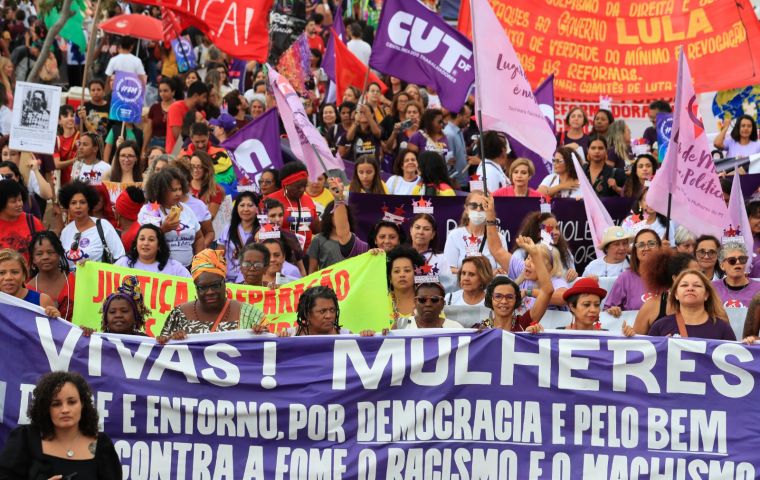MercoPress. South Atlantic News Agency
Brazilian women march against increase in femicides
 Eight women have been murdered so far in 2023 in Brasilia
Eight women have been murdered so far in 2023 in Brasilia Brazilian women focused Wednesday during their annual March 8 march across the Federal District of Brasilia (DF) on the eight femicides already recorded so far this year in the country's capital, Agencia Brasil reported.
In the first two months of 2023, eight cases of femicide were registered in the Federal District. According to the Public Safety Secretariat of the DF (SSP-DF), only in the first week of 2023, four cases were recorded. During all of last year, 17 women were murdered in the DF, victims of femicide. One of the coordinators of the Casa Ieda Santos Delgado, Thaís Oliveira stressed that there is a lack of shelter spaces for women victims of domestic violence in the country's capital.
“The march today is for these eight women who are no longer here. There was an increase in the number of cases of femicide in DF and these women died just for being women. Today is a day to remember the thousands of women who had their lives taken by machismo and fascism,” she said.
“Domestic violence is worrying and we have been since last year without a physical space because we were evicted by governor Ibaneis [Rocha, currently removed from office]. We continue the work in an itinerant way, with partnerships, but the requests for support don't stop coming,” he added. The Casa Ieda Santos Delgado is a reference space for women in situations of domestic violence.
According to the coordinator of the Women's Secretariat of the Union of Teachers of the Federal District (Sinpro-DF), Mônica Caldeira, the movement also seeks to raise awareness of the local government for an education that is committed to combating gender violence.
“We understand that the formation of society based on human rights and against sexist manifestations inside the school is fundamental. The curriculum should have interdisciplinary content with themes focused on the inclusion of women. It is also fundamental that there are laws aimed at criminalizing misogyny. We already have laws against racism and pedophilia, but we still need to advance in this sense, because misogyny also kills,” she warned.
“I am a woman and I am directly interested in my rights to be able to exercise real freedom, such as going out alone at night or even having an abortion safely in a hospital,” the 34-year-old dancer Priscila Assis said. “In addition, I believe we should demand more public safety measures for women, such as training for police officers. I think there is a lack of structure to attend women when something happens and there are only male police officers,” she insisted.
Alongside Priscila, psychologist Clara Barros, 34, reiterated the request for more security and education for women.
“People lack awareness. There was a distortion of what we learned about gender issues in the Bolsonaro government. People need to understand that it is fundamental to talk about machismo,” she said. “I have a daughter and I feel that I need to shield her from this violence that we live with, but at the same time I need to teach her about safety issues, and I do the same with my husband. All the time I feel that I have to teach her how to deconstruct the machismo that he has learned throughout his life,” she said.
Meanwhile, Supreme Federal Court (STF) Justice Alexandre De Moraes has ordered the release of 149 more women who had been arrested in connection with the Jan. 8 riots in Brasilia. So far, 407 women have been released while 82 others remain under arrest. The decisions were announced by the STF on Wednesday, marking International Women's Day. De Moraes argued that those women who were released posed less of a threat to the investigation, although they were charged by the Federal Public Ministry (MPF) with incitement to crime and criminal association.
Four women suspected of armed criminal association, violent abolition of the democratic rule of law, coup d'état, aggravated damage by violence and serious threat, and deterioration of public property have also been released, according to Agencia Brasil, due to their chronic health problems, like cancer, or the need to look after a child with special needs.
As per De Moraes' decision, all released women must report to the district of their residence within 24 hours and must reappear weekly. In addition, they will all have their passports suppressed and any authorization to carry weapons suspended. They are also banned from leaving their homes at night, using social media, and contacting other people under investigation. (Source: Agencia Brasil)




Top Comments
Disclaimer & comment rulesCommenting for this story is now closed.
If you have a Facebook account, become a fan and comment on our Facebook Page!